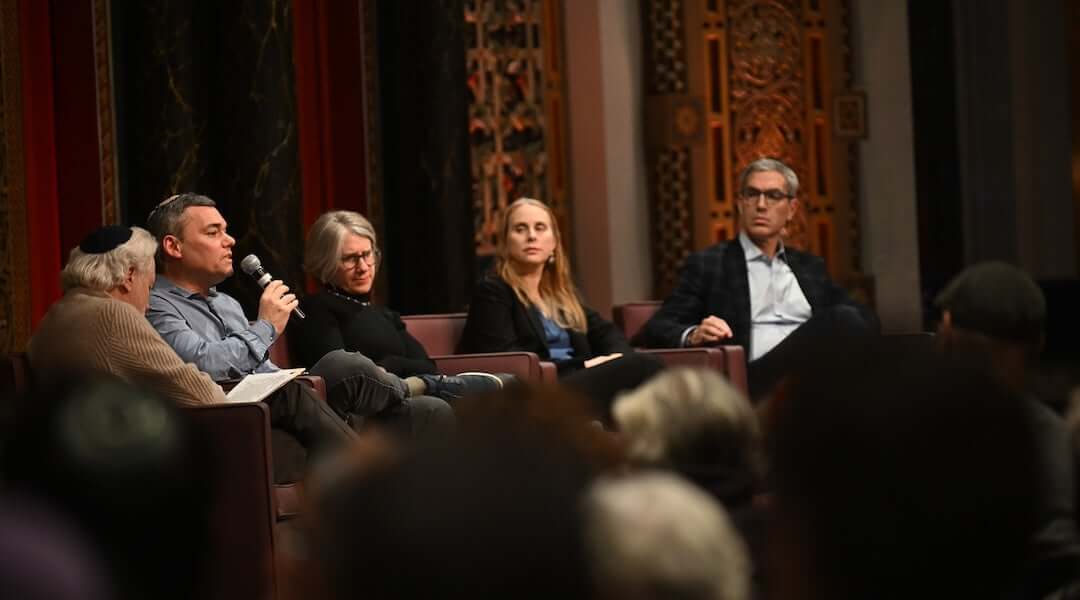How American Jews Enable Bibi’s Never-Ending Cycle Of Abuse

Image by Getty Images
There once was a feeling among American Jews that Benjamin Netanyahu was one of theirs. For decades, Israel had been represented on the international stage by a parade of grey, rumpled bureaucrats, brash generals and uncouth political hacks. When Bibi arrived on the scene, immaculately dressed and without a trace of accent, it was as if he’d been custom designed to appeal to an American audience.
To some extent, it was an accident of circumstance. He had spent nearly all his formative years in the United States, and for a time had US citizenship, thanks to a maternal grandfather, Benjamin Segal, who emigrated in 1911 from Minneapolis to Petach Tikva. (He was also, fittingly, Bibi’s namesake.)
But Bibi knew how to make his American heritage work for him. He had a knack of putting his audiences at ease, with a self-deprecating joke or a sports anecdote or a quote from a dead president or famous general. For a moment, he would be one of them. Only later would he remind his listeners that he was actually Israeli, usually with some reference to his own military service.
Watch him today on Fox News or at AIPAC, and you’ll see he’s been doing exactly the same shtick for forty years, filtering an Israeli persona through an American photo lens.
Ironically, throughout his public life, Israelis have also seen Netanyahu through this lens. Netanyahu’s political opponents have always accused him of being too American, even of being a yored, the pejorative term for an Israeli who has left the country. Israelis have also accused Bibi of having only returned to Israel in order to reap political capital from the glory of his dead brother, Yoni, the hero of Entebbe.
There is just something too shiny, too artificial and calculated about him, to be authentically Israeli.
But the truth is that both groups are wrong. No matter how many years he lived in the US, how polished his accent and his expensive Zegna suits, Benjamin Netanyahu has always been much more connected to his Israeli than his American side.
For one thing Netanyahu never was and never wanted to be was an American Jew.
An anecdote from 1984, shortly after Netanyahu had been appointed Israel’s ambassador to the United Nations, illustrates the point quite starkly. Netanyahu and his second wife, Fleur, were breakfasting at the Regency Hotel with a prominent leader of the settler movement. “Jewish matrons kept coming up, complimenting him on his television performance and inquiring if he wasn’t also an American citizen, because he should run for president one day,” the settler leader told me.
After basking in their attention, Netanyahu turned around and ordered bacon and eggs. Fleur, who was undergoing conversion, scolded him, embarrassed that he would order bacon in public. But it was classic Netanyahu: He always took the Diaspora’s adulation, particularly the admiration of American Jews, for granted. He never cared for their sensitivities and sensibilities.
And while Netanyahu is constantly reading American books, mainly biographies, you will never catch him reading one on a Jewish theme (except when its Middle East politics and history), or hear him quote an American Jewish thinker. For an intellectual, he lacks any curiosity about the history of American Jewish society.
And yet, American Jews have always been prepared to forgive any of his shortcomings and treat him as their own.
For though there’s much talk now about a crisis in Israel-Diaspora relations, this toxic relationship was very much the work of Diaspora Jews and their adulation of Benjamin Netanyahu.
*
By the time he turned eighteen, Netanyahu had spent over a third of his life in the US. From eight to ten, he lived in Manhattan and Long Island, and from thirteen onwards, he lived in suburban Philadelphia.
He rarely reminisces about these periods, which he spent by and large longing for and trying to get home, to Israel.
The first period was particularly upsetting for a bright boy sitting clueless in class, trying to grasp at words in an unfamiliar language. When in 1962, his parents informed him that they were returning to the US, he recalls the news as “very traumatic” and “very hard.” The whole episode was “a terrible dislocation.”
Nevertheless, he excelled at the school he attended with his brother, Cheltenham High, and received a National Merit Letter of Commendation upon graduation.
But he never stopped feeling alien. At least half of Cheltenham High’s students were Jewish, but Netanyahu made few friends, none of them lasting. He barely took part in extracurricular activities, besides playing on the soccer team and being in the chess club.
He has never said so publicly, but it is clear from the accounts of his friends back in Israel that he shared a deep disdain for American Jews with brother Yoni and his father Benzion, the main influences on his life growing up.
Benzion saw American Jews as soft and westernized, not the valuable human resources that Israel needed. Those had been the millions of hardy East European Jews murdered in the Holocaust.
His sons inherited this disdain. As Yoni complained in one of his letters to a friend back in Jerusalem, “People here talk about cars and girls. Life revolves around one subject — sex, and I believe Freud would have rich ground here to seed and pick his fruit.” Yoni concluded that he was living “among monkeys, not humans.” In another letter, he wrote, “The problem with the young people here is that their lives are so poor in substance and are passed as if in a dream or game.”
Of American Jewish life, Bibi learned nothing. He failed to connect to religious or ritual life; the secular Netanyahu family rarely attended a synagogue. And as for the American Jewish culture, the family had nothing but contempt for it.
It would provide a palimpsest for the rest of his life, a match made in heaven between a contemptuous Netanyahu and an adoring American Jewish fan base.
And though he would learn to understand how American Jews think, and how to turn this to his advantage, he would never come to appreciate them or respect them.
And they, for their part, would never ask this of him.
*
It’s not only their own marginalization that American Jews have allowed Bibi to get away with, but a rift between the Israel and the US more generally.
Netanyahu has often been accused by his critics in Israel and the US of causing “unprecedented damage” to the ties between the two countries, though there is little he has done that wasn’t done already by his predecessors. Golda Meir, Yitzhak Rabin, Menachem Begin and Yitzhak Shamir all had very public arguments with the American administrations of their day and were not above trying to lobby Congress against sitting presidents when they felt it was in Israel’s interest.
Still, Netanyahu has been more brazen in challenging presidents, more in-your-face. He felt he could get away with lecturing American leaders. (Clinton famously said after their first Oval Office meeting, “who the fuck does he think he is? Who’s the fucking superpower here?”)
This brazenness is largely due to Netanyahu’s arrogance, his sense of entitlement and his conviction that he knows as much and perhaps more about American history than any president and can therefore argue with them about “American values.”
But the leadership of American Jewry is also partially to blame. For they have long been Bibi’s enablers in this self-perception.
Part of it had to do with external forces. A sea change in the Jewish establishment was already taking place when Netanyahu arrived as a young diplomat in 1982. The men at the top of the major Jewish organizations were being replaced, or adapting themselves in the early 1980s, to a new era of Likud governments and Republican administrations.
Both within Jewish organizations and without, these news leaders would serve at Netanyahu’s pleasure. In thirty years of speeches in the AIPAC echo chamber, the fact that the large majority of American Jews disagree with his policies was never brought home to him.
It’s not that Netanyahu doesn’t read the surveys or know that the overwhelming majority of American Jews have throughout his lifetime voted for the Democratic candidate in every single presidential election. Rather, he has been simply allowed to convince himself that those who disagree with him do not matter.
And it was American Jews who convinced him of that.
It was American Jews who served as his first admiring audiences as he practiced on them, honing his rhetorical talents. It was American Jewish journalists who propelled him to fame in the US media, which got him notice back home in Israel and sparked his meteoric political career. American Jewish donors funded his campaigns and the American Rabbi Menachem Mendel Schneerson gave him his public blessing.
It wasn’t just symbolic. Two years after the Rebbe’s death, that blessing would motivate thousand of Lubavitcher Hasidim to plaster every wall in Israel with “Netanyahu is good for the Jews” slogans, pushing him over the finish line by a whisker in his 1996 election victory over Shimon Peres.
And in the periods in which Netanyahu languished at home in the wilderness of the opposition, it was from American Jews that he received the most sympathy. At times, AIPAC even helped him lobby against policies of centrist and center-left Israeli governments.
Netanyahu sees the support of American Jews as no more than his just due. He has only ever had time for those who can help him. And he has thrown them by the wayside when they proved no longer of any use to him.
Take cosmetics heir and billionaire Ronald Lauder, who granted Netanyahu two decades of patronage, opening the doors of New York’s business elite. On Netanyahu’s urging, Lauder acquired a majority stake in Israel’s chronic loss-making Channel Ten. But when Lauder would not, or could not, force the channel’s journalists to drop investigations in to Bibi and Sara’s personal financial affairs, Netanyahu discarded Ron Lauder. By that time, Lauder was president of the World Jewish Congress, but even in that august role, he couldn’t get face-time with the prime minister of Israel.
By then, Netanyahu had a new Jewish American benefactor, casino mogul and billionaire Sheldon Adelson. Adelson was willing to go one step further than Lauder and spend hundreds of millions of dollars setting up a whole newspaper from scratch, Yisrael Hayom, to be distributed freely across Israel. Its journalists were left with no doubt when hired that their role was to unquestionably lionize Bibi and Sara.
But even Adelson would become expendable. In 2015, Netanyahu went behind Adelson’s back to the owner of Yedioth Ahronot, the one paper he always dreamed of winning over. There he discussed the possibility of getting Adelson to limit Yisrael Hayom’s distribution in return for favorable coverage in Yedioth. Now the police are recommending he be indicted for bribery and fraud over those discussions.
For all the money Adelson has poured in to Yisrael Hayom, Netanyahu is not satisfied. “Market share isn’t necessarily power,” he has grumbled, remarking that the paper has “little influence.” On his relationship with Adelson he has said, “Do you think I can tell that redhead what to do?”
You would have expected a man who owes his extraordinary political career to American Jews to have shown them some gratitude and taken their concerns into consideration.
But that man is not Netanyahu. When you’re Bibi Netanyahu, even the third richest Jew in the world can be cast aside.
*
Nowhere was Netanyahu’s erasure of American Jews more obvious than in his relationship with President Barack Obama.
At least three million American Jews are estimated to have voted for Barack Obama in 2008. That is twice the number of Israelis who voted for Netanyahu for prime minister in the only direct elections Israel ever had, in 1996. Likud under Netanyahu has never surpassed the million-voters mark.
No elected leader in any country has ever received more Jewish votes than Obama did, by a wide margin.
But as leader of Israel, Netanyahu has claimed to be acting “not just as the prime minister of Israel but as a representative of the entire Jewish people.”
This was the claim he used to justify his biggest challenge ever of an American president, his address to Congress on March 3, 2015. There he exhorted members of congress to block Obama’s key foreign policy legacy, the nuclear agreement with Iran. Though his decision to go to Washington and confront the president head-on caused much hand-wringing among the American Jewish establishment, vanishingly few senior figures in its leadership openly called upon Netanyahu to stay at home.
Why did next to none of them stand up for their own president? Why did none of them stand up for the American Jews who voted for him by huge margins?
It has to be said that there is a powerful argument on Netanyahu’s side. The majority of the Jews in the world may have chosen to remain in the Diaspora, but the prime minister of Israel has been elected not only to protect Israel’s citizens; he also has a duty to safeguard the haven for the Jewish people, which hopefully they will never need, but one day they might.
Still, the covenant between Israel and the Diaspora should go both ways, especially when the leader that the prime minister is challenging on the Jews’ behalf is their own president.
The silence from the Jewish establishment over Netanyahu’s address to Congress was deafening. And it was the ultimate enabling of Bibi.
It wasn’t always so. In 1950, when David Ben Gurion proclaimed that Israel was now the center of the Jewish people, Jacob Blaustein, president of the American Jewish Committee, rushed to Jerusalem to upbraid the prime minister.
“There can be no single spokesman for world Jewry no matter who that spokesman might try to be,” he insisted.
Blaustein then forced Ben Gurion to give him a written commitment that Israel would not speak on behalf of the Jews of the Diaspora.
Can you imagine the head of the AJC, or any other major Jewish-American organization for that matter, doing that today?
Netanyahu believes he can say what Ben Gurion could not, electing himself as the representative of all Jews, because today there are in Israel almost as many Jews as in the US and Israel has much less need of their support. He believes he can say it because he is Netanyahu and he knows best.
But most importantly, Netanyahu believes he can say he represents all Jews because American Jews have always let him get away with whatever he wanted, which ultimately included their own erasure at his behest.
*
Recently, there are signs of a reckoning, both among some progressive Jewish leaders and among a younger generation of American Jews who are no longer staying silent. Last year, after Netanyahu reneged on the Kotel Agreement which was to have given Reform and Conservative Jews control of a prayer area of their own by the Western Wall, a group of visiting progressive leaders boycotted a meeting with the prime minister.
The standard reasoning behind the devoutly secular Netanyahu’s decision on the Kotel was that domestic politics trumps everything. His ultra-Orthodox coalition partners have more leverage over him than progressive Jews, few of whom can vote in Israel, and don’t support him anyway.
But it goes deeper than that.
Netanyahu believes he has little to gain from currying favor with progressive Jews. While the media likes to make headlines from surveys showing declining support for Israel among the young generation of American Jews, Netanyahu prefers to believe in demography. In private, he predicts that progressive Jews will eventually dwindle and assimilate. The future of American support for Israel is with Orthodox Jews and Christian Evangelicals, Netanyahu believes. Conveniently, these are the communities who support him and his hawkish policies.
To Netanyahu, Jews who don’t support him and his vision for Israel are weak, lacking in identity and unlikely to persevere for another generation. And who says Netanyahu doesn’t listen to American Jews? Just look at so many of the advisors he has surrounded himself with over the years, like Ron Dermer, Naftali Bennett, Ari Harow, Dori Gold, and David Keyes. He has so many American Jews in his employ that meetings in his office are often conducted in English instead of Hebrew.
These are the American Jews, now Israeli, who reinforce the echo chamber and remind Netanyahu that those who matter are with him no matter what.
Though a backlash is finally beginning to take shape, it is too slow in forming, and Netanyahu himself has been isolated for so long, for him to take notice. Some of his advisors are aware of it. Dermer, now in his fifth year as Netanyahu’s ambassador to the US, recently warned him of growing dissatisfaction among American Jews with the government’s plan to deport over 30 thousand African asylum-seekers to an uncertain future in Rwanda and Uganda.
It was to no avail. If the deportation plan will be foiled, it will be due to the Israeli courts, rather than Diaspora pressure.
Even worse, Netanyahu is incapable of understanding the degree to which he is betraying American Jews with his unfailing endorsement of everything Donald Trump does and says (70% of American Jews voted for Hillary).
And if he could understand, he wouldn’t care. If he cared, he wouldn’t have stayed silent over Trump’s bizarre empathy for white supremacists after Charlottesville. But whether it’s Jews from Hungary, who Netanyahu betrayed when he endorsed Viktor Orban, or American Jews, they simply don’t matter.
Netanyahu has ridden roughshod over decades of Israeli diplomatic orthodoxy whereby Jerusalem always follows the lead of local Diaspora communities when they are confronted with anti-Semitism. None of them matter any more. He decides who is good for the Jews and who is anti-Semitic. Trump, Orban, the Holocaust revisionists in Poland and the new far-right coalition in Austria are all supportive of his policies and therefore must be good for the Jews. All Jews.
It is too late for Netanyahu. He has been in the echo chamber for too long and won’t change. But hopefully he is finally nearing the end of his career, brought down by the weight of his own corruption.
A reckoning among American Jews who have been Netanyahu’s enablers for so long must take place now, before his successor takes office.
Another Israeli leader must never again be allowed to use and abuse American Jews in such a way and take the Diaspora for granted.
Anshel Pfeffer’s ‘Bibi: The Turbulent Life and Times of Benjamin Netanyahu’ is published by Basic Books.















